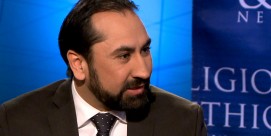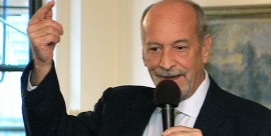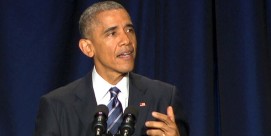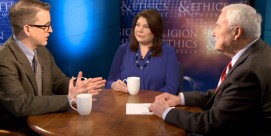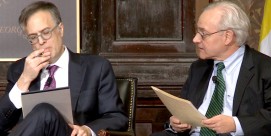Brendan Sweetman: The Pluralism Problem
 Listening to President Obama’s State of the Union address, one underlying theme made a big impression: the problem of pluralism and how to deal with competing worldviews, ideologies, values, and political beliefs in the same country.
Listening to President Obama’s State of the Union address, one underlying theme made a big impression: the problem of pluralism and how to deal with competing worldviews, ideologies, values, and political beliefs in the same country.
It is clear that the president is struggling with this question. Since he came into office he has been frustrated and perhaps baffled by the difficulty he and many leaders experience in actually trying to govern when they obtain political power in a democracy. President Obama is mindful of the fact that the American people have an extremely low opinion of Washington, that they blame Washington not only for the current mess we are in but also for not being able to do anything about it. We hear the president’s long list of proposals on issues such as the economy, regulation of financial institutions, health care, and education, and we all know from bitter previous experience that most of his agenda simply will not happen.
The president acknowledged the many differences people have on these and other topics, and he was clearly troubled by the fact that political agreement is difficult to achieve. Yet in an almost desperate attempt to find a way forward, he made a strong appeal to our “shared values” and the fact that both sides of the political aisle simply have to work together. He rightfully spent most of his time on the economy, and he is aware that our economic worries tend to overshadow our ideological differences, for a time at least, and they can bring us together as we try to find a way out of the mess that was created largely by human greed. He made the same point about national security: when we are under attack the nation is united. But he is also aware, although he made no mention of it, that a common purpose does not mean agreement on a common solution, as the bitter arguments about how to deal with security matters testify. The same is unfortunately true for our economic problems, as partisan debates about taxes, health care reform, and the economic stimulus package show.
The problem of pluralism, unfortunately, leads to very nasty partisan politics. It might help us to remember, as anyone who has studied the history of American politics will know, that it has always been like this in terms of political infighting, partisan attacks, and political corruption, though we are now more ideologically split than we have ever been before.
The president was inconsistent in his speech, however, because while he was asking us all to work together and to try to put our political differences aside in the interests of solving our problems and emphasizing our shared values, he directed a very pointed attack at the Supreme Court from this most conspicuous of forums, accusing it of undoing a century of law on campaign finance reform. This draws attention to another feature of an ideologically divided nation—that the Supreme Court, which is supposed to be above politics, is in great danger of actually becoming just another political body. One supports them when they deliver a judgment that is in accord with one’s worldview and criticizes them when they deliver a judgment that is not, and the “independence” of the law goes out the window. In our present climate the Court has lost its independence on many of the hot-button topics of the day. All sides have now realized that influencing the make-up of the Court gives one a better chance of shaping American society and culture according to one’s beliefs and values than the slow, difficult, and costly process of trying to get legislation through Congress.
Whether we like it or not, America is at times a divided nation. But I was struck by the fact that underlying much of the president’s remarks was a powerful theme: that we are all human beings, and that we have many shared values on the important things in life like morality, education, and the common good. Our economic and security concerns make us see from time to time that many of our disagreements are petty, and, as the president rightfully said, we all have a responsibility to strive to make progress as a country.
President Obama referred to a number of these shared concerns: we want a job that pays the bills, that allows us to get ahead, and that will help us give our children a better life. He drew attention to the fact that we share a stubborn resilience and a fundamental decency, strength, generosity, and courage that will always see us through in the end.
Every now and again an extraordinary individual comes along and helps us concentrate on our shared values, rise above our differences, and move forward together to solve our difficult problems. President Obama carried great promise into office, but his star has faded a little in his first year. It remains to be seen whether he can overcome the problem of pluralism, where so many have failed, to lead us forward as a nation.
Brendan Sweetman is professor of philosophy at Rockhurst University in Kansas City, Missouri, and the author of Why Politics Needs Religion: The Place of Religious Arguments in the Public Square (InterVarsity Press, 2006) and, most recently, Religion and Science: An Introduction (Continuum Books, 2010).


